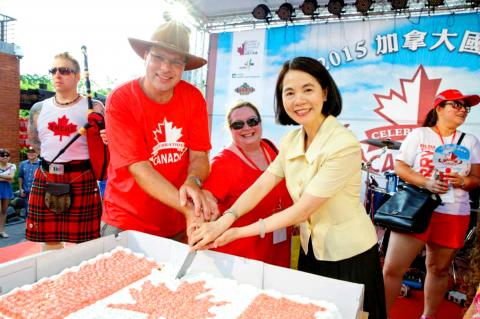When Carrie Kellenberger was a child, her family celebrated Canada Day by roasting marshmallows on a big barbecue at their cottage by the lake in North Bay, Ontario.
“I am from a very small town in Ontario and my family lived in the country,” says Kellenberger, who serves as a chairperson for the Canadian Chamber of Commerce in Taipei.
“From time to time, we’d also go into town to celebrate at our annual hometown Canada Day celebration at the local riverside park.”

Photo courtesy of Canadian Chamber of Commerce in Taiwan
Tomorrow’s Canada Day event at Taipei Hakka Cultural Park will seek to recreate this homely, celebratory vibe in a similar outdoor, natural setting.
The annual celebration, now in its 11th year, will offer a range of Canadian treats such as maple pie, as well as imported beer and cider from the Great White North. This year will see the addition of an art corner, along with the usual attractions, including hockey, line dancing, fireworks and activities geared toward young visitors: a face painting booth and bouncy castle. Not to mention the mechanical bull, which has proven to be hugely popular among visitors of all ages in previous years.
“You’d be surprised how many people take a ride on the mechanical bull,” Kellenberger tells the Taipei Times.

Photo courtesy of Canadian Chamber of Commerce in Taiwan
Though she left Canada in 2003 to travel the world and eventually settled down in Taiwan in 2006, Kellenberger still believes that it’s important for expats to keep their traditions alive.
“For expats, the longer we are away from our home country, the more important our traditions become.”
One tradition we will not be seeing tomorrow is the Canadian Snowbirds show, an air show put on by the Canadian Forces at Parliament Hill in the nation’s capital city, Ottawa, each year. Kellenberger recalls attending the air show as a young adult, something which she describes as being “always exciting.”
She adds, though, that in some ways, Canada Day celebrations abroad are more of a novelty because they’re also about sharing your culture, food and crafts with people from other backgrounds.
“It’s important for all of us to come together to celebrate the rich and diverse tapestry of communities in Taiwan.”

Taiwan Power Co (Taipower, 台電) and the New Taipei City Government in May last year agreed to allow the activation of a spent fuel storage facility for the Jinshan Nuclear Power Plant in Shihmen District (石門). The deal ended eleven years of legal wrangling. According to the Taipower announcement, the city government engaged in repeated delays, failing to approve water and soil conservation plans. Taipower said at the time that plans for another dry storage facility for the Guosheng Nuclear Power Plant in New Taipei City’s Wanli District (萬里) remained stuck in legal limbo. Later that year an agreement was reached

What does the Taiwan People’s Party (TPP) in the Huang Kuo-chang (黃國昌) era stand for? What sets it apart from their allies, the Chinese Nationalist Party (KMT)? With some shifts in tone and emphasis, the KMT’s stances have not changed significantly since the late 2000s and the era of former president Ma Ying-jeou (馬英九). The Democratic Progressive Party’s (DPP) current platform formed in the mid-2010s under the guidance of Tsai Ing-wen (蔡英文), and current President William Lai (賴清德) campaigned on continuity. Though their ideological stances may be a bit stale, they have the advantage of being broadly understood by the voters.

In a high-rise office building in Taipei’s government district, the primary agency for maintaining links to Thailand’s 108 Yunnan villages — which are home to a population of around 200,000 descendants of the Chinese Nationalist Party (KMT) armies stranded in Thailand following the Chinese Civil War — is the Overseas Community Affairs Council (OCAC). Established in China in 1926, the OCAC was born of a mandate to support Chinese education, culture and economic development in far flung Chinese diaspora communities, which, especially in southeast Asia, had underwritten the military insurgencies against the Qing Dynasty that led to the founding of

It’s fairly well established that strength training is helpful at every age: as well as building muscle, it strengthens tendons and ligaments, increases bone density and seems to have protective effects against everything from osteoporosis to dementia. But a new study based on data collected over two decades in Rio de Janeiro, Brazil, suggests that another physical attribute might be just as important — and it’s one that declines even faster than strength as the years go by. The good news? It might also be less uncomfortable, and even slightly safer, to improve. Also, it will probably make you better